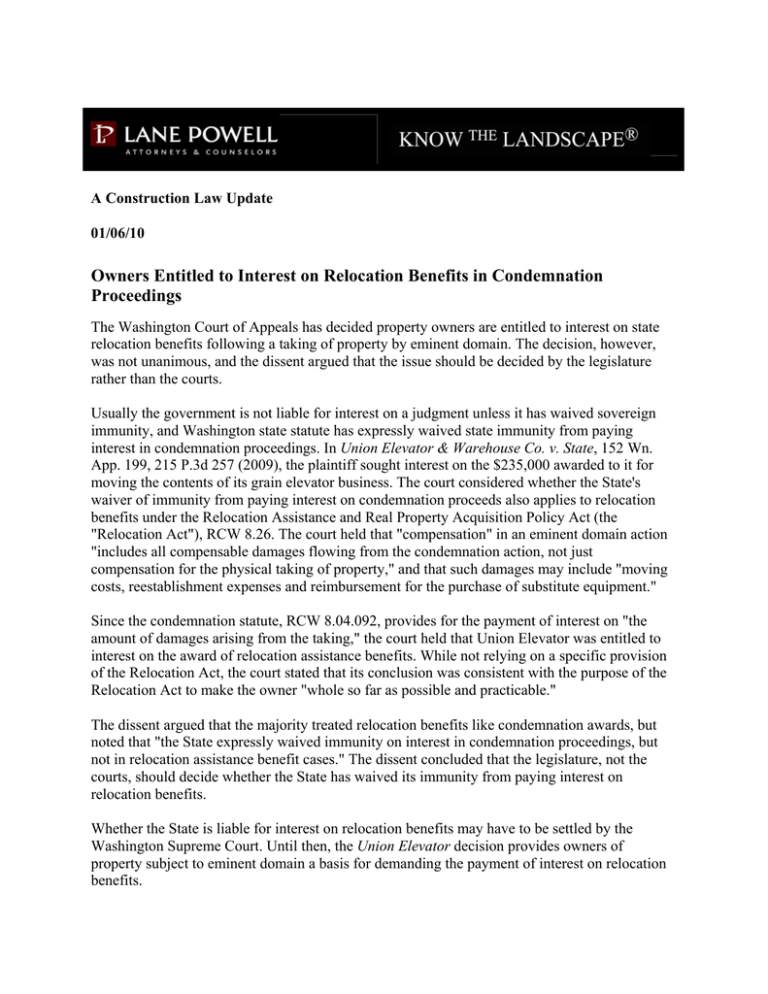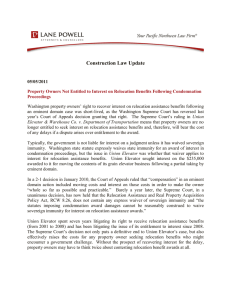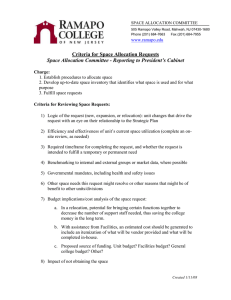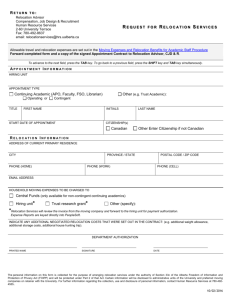Owners Entitled to Interest on Relocation Benefits in Condemnation Proceedings
advertisement

A Construction Law Update 01/06/10 Owners Entitled to Interest on Relocation Benefits in Condemnation Proceedings The Washington Court of Appeals has decided property owners are entitled to interest on state relocation benefits following a taking of property by eminent domain. The decision, however, was not unanimous, and the dissent argued that the issue should be decided by the legislature rather than the courts. Usually the government is not liable for interest on a judgment unless it has waived sovereign immunity, and Washington state statute has expressly waived state immunity from paying interest in condemnation proceedings. In Union Elevator & Warehouse Co. v. State, 152 Wn. App. 199, 215 P.3d 257 (2009), the plaintiff sought interest on the $235,000 awarded to it for moving the contents of its grain elevator business. The court considered whether the State's waiver of immunity from paying interest on condemnation proceeds also applies to relocation benefits under the Relocation Assistance and Real Property Acquisition Policy Act (the "Relocation Act"), RCW 8.26. The court held that "compensation" in an eminent domain action "includes all compensable damages flowing from the condemnation action, not just compensation for the physical taking of property," and that such damages may include "moving costs, reestablishment expenses and reimbursement for the purchase of substitute equipment." Since the condemnation statute, RCW 8.04.092, provides for the payment of interest on "the amount of damages arising from the taking," the court held that Union Elevator was entitled to interest on the award of relocation assistance benefits. While not relying on a specific provision of the Relocation Act, the court stated that its conclusion was consistent with the purpose of the Relocation Act to make the owner "whole so far as possible and practicable." The dissent argued that the majority treated relocation benefits like condemnation awards, but noted that "the State expressly waived immunity on interest in condemnation proceedings, but not in relocation assistance benefit cases." The dissent concluded that the legislature, not the courts, should decide whether the State has waived its immunity from paying interest on relocation benefits. Whether the State is liable for interest on relocation benefits may have to be settled by the Washington Supreme Court. Until then, the Union Elevator decision provides owners of property subject to eminent domain a basis for demanding the payment of interest on relocation benefits. For more information, please contact the Construction Law Practice Group at Lane Powell: 206.223.7000 Seattle 503.778.2100 Portland lppc@lanepowell.com www.lanepowell.com We provide the Construction Law Hotsheet as a service to our clients, colleagues and friends. It is intended to be a source of general information, not an opinion or legal advice on any specific situation, and does not create an attorney-client relationship with our readers. If you would like more information regarding whether we may assist you in any particular matter, please contact one of our lawyers, using care not to provide us any confidential information until we have notified you in writing that there are no conflicts of interest and that we have agreed to represent you on the specific matter that is the subject of your inquiry. Copyright © 2009 Lane Powell PC Seattle - Portland - Anchorage - Olympia - Tacoma - London 2



